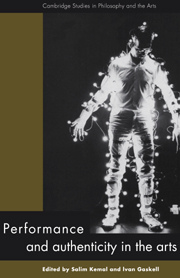Book contents
- Frontmatter
- Contents
- List of Contributors
- Editors' Acknowledgments
- 1 Performance and authenticity
- Part I Performance, religion, and authenticity
- 2 The Poetics of performance: the necessity of spectacle, music, and dance in Aristotelian tragedy
- 3 The “confessing animal” on stage: authenticity, asceticism, and the constant “inconstancie” of Elizabethan character
- 4 Art, religion, and the hermeneutics of authenticity
- Part II Understanding, performance, and authenticity
- Part III Authenticity, poetry, and performance
- Index
3 - The “confessing animal” on stage: authenticity, asceticism, and the constant “inconstancie” of Elizabethan character
Published online by Cambridge University Press: 12 November 2009
- Frontmatter
- Contents
- List of Contributors
- Editors' Acknowledgments
- 1 Performance and authenticity
- Part I Performance, religion, and authenticity
- 2 The Poetics of performance: the necessity of spectacle, music, and dance in Aristotelian tragedy
- 3 The “confessing animal” on stage: authenticity, asceticism, and the constant “inconstancie” of Elizabethan character
- 4 Art, religion, and the hermeneutics of authenticity
- Part II Understanding, performance, and authenticity
- Part III Authenticity, poetry, and performance
- Index
Summary
For persons persuaded by the rhetoric of sixteenth-century religious reformers, authenticity was a complex matter of access to the reality of divinity. George Levin's paper on empiricist “habits of mind” seems a strange place to start elaborating on that observation, for such “habits” look to be worlds apart from what I study, the sixteenth-century Calvinist adaptations of patristic and medieval ascetic spirituality. Yet Levin maintains that he has identified empiricism's near-ascetic techniques. “To know nature,” he claims, “one must make it alien … and deny one's own desire.” If he is correct about “the programmatically self-alienating” character of “the positivist model of knowledge” and about the empiricist assumptions it extends and refines, then perhaps asceticism, Calvinism, empiricism, and positivism someday will file companionably through sweeping histories of the human imagination. If he is correct, that is, and if the historians of that someday are still reupholstering old ideas and long-standing “habits of mind.” I cannot pronounce authoritatively on the first condition and am only slightly tempted to guess about the second. Not so George Levin, who crosses cavalierly from self-alienation to self-annihilation, sure that “the religious/moral implications of that tradition of self-annihilation continue to thrive in the practice of science and the language of the social sciences.”
“That tradition” interests me as it does a small army of others who are fascinated by the alienation and alleged self-annihilation on the Elizabethan stage.
- Type
- Chapter
- Information
- Performance and Authenticity in the Arts , pp. 49 - 65Publisher: Cambridge University PressPrint publication year: 1999
- 1
- Cited by



